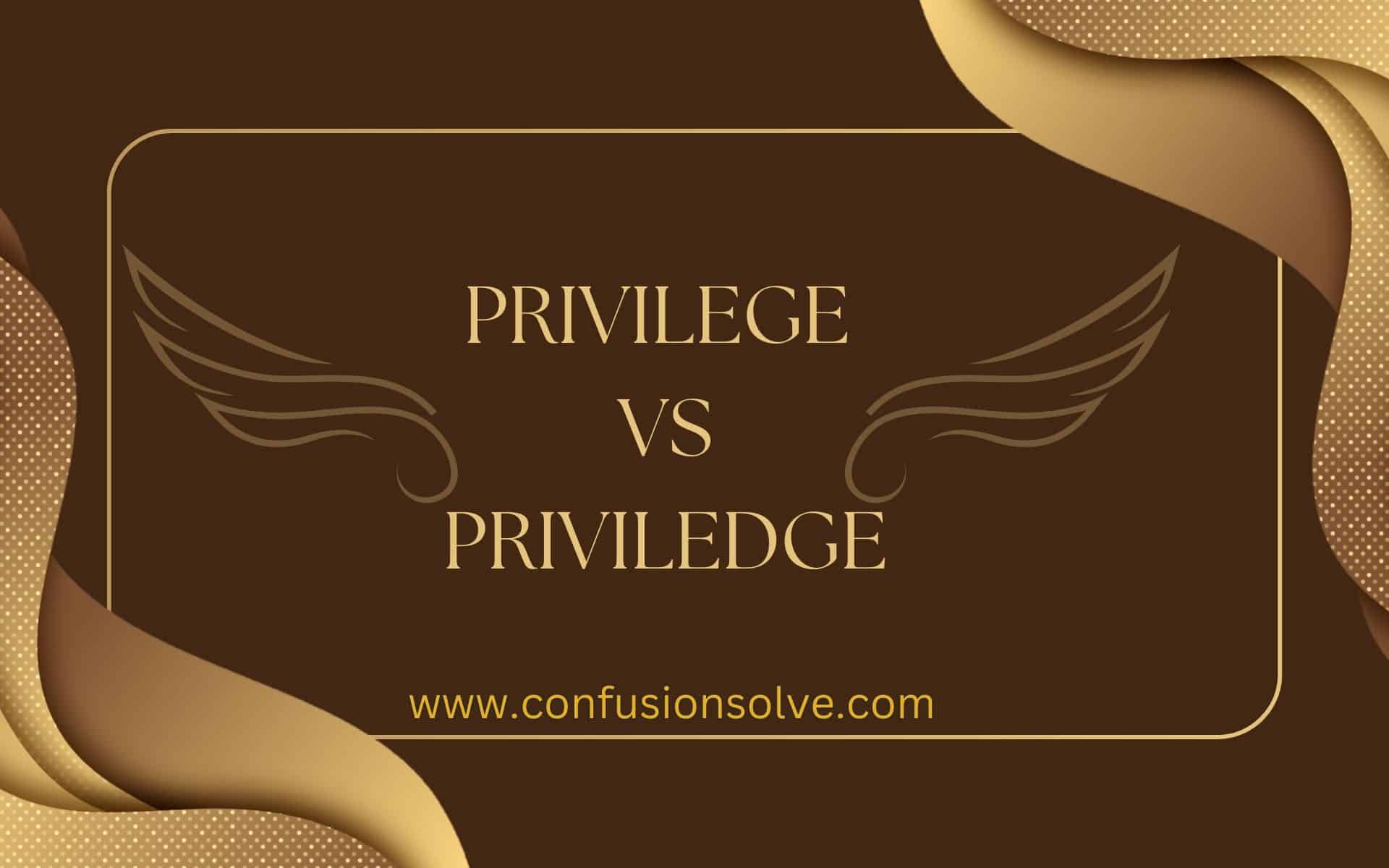Spelling matters—especially when it comes to words like privilege and priviledge. One is correct, and the other is a common misspelling that can undermine your writing.
In a world where clear communication is key, getting it right shows attention to detail and respect for your audience. Whether you’re drafting an email, writing an essay, or posting on social media, spelling privilege correctly ensures your message is polished and professional.
But why do so many people get it wrong? From word confusion to similar-sounding terms, the reasons are fascinating. Let’s dive into the correct spelling, its meaning, and why it’s more than just a grammar lesson—it’s about effective communication in every aspect of life.
Understanding the Correct Spelling: Privilege vs. Priviledge
The correct spelling is privilege, with no “d” before the “g.” The word refers to a special right, advantage, or immunity that some people or groups have. For example, access to quality education or healthcare is a privilege not everyone enjoys. On the other hand, priviledge is a common misspelling. It doesn’t exist in the English language, even though it looks similar to words like knowledge and acknowledgment.
Understanding the correct spelling is more than just a grammar lesson. It’s about respecting the meaning behind the word. Privilege often describes unequal advantages in society, like educational privilege or economic advantages. Using the correct spelling shows you understand its importance and want to communicate effectively.
Why “Priviledge” Is a Common Misspelling
Many people spell privilege as priviledge because of word confusion. Words like knowledge and acknowledgment end with “-ledge,” so it’s easy to assume privilege follows the same pattern. However, this assumption is wrong. Another reason for the common misspelling is pronunciation. When we say privilege, the “d” sound isn’t strong, making it harder to remember if it’s actually there.
This confusion highlights why tools like ProWritingAid and other grammar checkers are so helpful. They catch spelling errors before they slip through, ensuring your writing is accurate and professional. By understanding why the mistake happens, you can train yourself to spell privilege correctly every time.
The Definition and Meaning of Privilege
Privilege means having a special right, advantage, or immunity that others might not have. It can refer to social benefits, like growing up in a safe neighborhood, or economic advantages, like having access to financial resources. Privilege isn’t something everyone gets; it’s often unearned and tied to circumstances like race, gender, or socioeconomic status.
For example, being able to travel freely or attend a good school are forms of privilege. These unequal advantages can shape opportunities and outcomes in life. Understanding the meaning of privilege helps us recognize its impact on society and work toward fairness and equality.
Examples of Privilege in Everyday Life
Privilege shows up in many areas of life. For instance, having access to clean water is a privilege many take for granted. Another example is educational privilege, where some students attend well-funded schools while others don’t. Economic advantages also play a role, like being able to afford healthcare or housing.
Here’s a table showing different types of privilege:
| Type of Privilege | Example |
| Social Privilege | Growing up in a safe neighborhood |
| Economic Privilege | Having access to financial resources |
| Educational Privilege | Attending a well-funded school |
| Cultural Privilege | Being able to travel and explore cultures |
These examples show how privilege affects people’s lives in different ways.
How to Use “Privilege” Correctly in Sentences
Using privilege correctly in sentences is easy once you know the rules. For example, you might say, “It’s a privilege to work with such a talented team.” Here, privilege conveys honor and opportunity. Another example is, “Access to clean water is a privilege many take for granted.” This highlights the unequal advantages some people have.
Here are a few more examples:
- “She felt privileged to attend the prestigious university.”
- “Having a supportive family is a privilege not everyone enjoys.”
- “The privilege of free speech is protected by law.”
By using privilege correctly, your writing becomes clearer and more impactful.
You may also like:Other Than or Other Then: Which is Correct?
The Difference Between Privilege and Priviledge
The difference between privilege and priviledge is simple: one is correct, and the other isn’t. Privilege is the only valid spelling, while priviledge is a common misspelling. This mistake often happens because of similar-sounding words like knowledge and acknowledgment.
Here’s a quick comparison:
| Aspect | Privilege | Priviledge |
| Correct Spelling | Yes | No |
| Meaning | Special right or advantage | Not a valid word |
| Usage | Correct in all contexts | Incorrect in all contexts |
Always choose privilege to ensure your writing is accurate and professional.
Common Spelling Mistakes in the English Language
Privilege isn’t the only word people misspell. Other common spelling mistakes include “accommodation,” “definitely,” and “separate.” These errors often happen because of word confusion or spelling patterns that don’t follow standard rules.
For example, many people write “definately” instead of “definitely.” Others confuse “accommodation” with “accomodation.” These mistakes can make your writing look unpolished, but they’re easy to fix with practice and tools like ProWritingAid.
Why Spelling “Privilege” Correctly Matters
Spelling privilege correctly matters because it shows attention to detail and respect for the topic. In professional writing, spelling errors can harm your credibility. For example, a resume with misspelled words might not make it past the first round of reviews.
In academic writing, writing accuracy is crucial for clear communication. Misspelling privilege as priviledge can distract readers and weaken your argument. By getting it right, you show you care about effective communication and polished writing.
How to Avoid Misspelling Privilege as Priviledge
Avoiding the common misspelling of privilege is easier than you think. One tip is to remember that privilege doesn’t have a “d” before the “g.” Another strategy is to associate it with similar words like “legal privilege.”
You can also use grammar tools like ProWritingAid to catch spelling errors. These tools highlight mistakes and suggest corrections, making it easy to write with confidence.
You may also like:Shiny vs Shiney – Which Form is Correct?
The Role of Grammar Tools in Correcting Spelling Errors
Grammar tools like ProWritingAid and Grammarly are lifesavers for writers. They catch spelling errors, improve sentence structure, and enhance writing accuracy. For example, if you type priviledge, these tools will flag it and suggest the correct spelling, privilege.
Using these tools ensures your writing is clear, professional, and free of mistakes. They’re especially helpful for non-native English speakers or anyone looking to improve their writing confidence.
Examples of Privilege in Literature and Popular Books
Many famous books use privilege to explore social and economic themes. For example, in The Great Gatsby, the characters enjoy economic advantages but struggle with moral emptiness. In To Kill a Mockingbird, the story highlights social privilege and racial inequality.
Here’s a quote from The Fault in Our Stars by John Green:
“It’s a privilege to have my heart broken by you.”
These examples show how privilege is used to convey deep emotions and societal issues.
How to Spell “Privileged” Correctly
The adjective form of privilege is privileged, spelled with a “d” at the end. For example, you might say, “She comes from a privileged background.” This means she enjoys special rights or advantages others might not have.
Here’s another example:
- “He felt privileged to be part of the team.”
Using privileged correctly adds depth and clarity to your writing.
The Impact of Spelling on Professional Writing
In professional writing, spelling errors can harm your reputation. For example, a business email with misspelled words might make you look careless. On the other hand, writing accuracy shows you’re detail-oriented and professional.
By spelling privilege correctly, you demonstrate clear communication and respect for your readers. This small effort can make a big difference in how others perceive you.
You may also like:Momma or Mama: Which One is Correct? A Complete Guide
Tips for Improving Your Spelling and Grammar Skills
Improving your spelling and grammar skills is easier than you think. Start by reading more books and articles to see how words are used. Practice writing regularly and use tools like ProWritingAid to catch mistakes.
Another tip is to create flashcards for common spelling mistakes. Review them daily to reinforce the correct spellings. Over time, these small steps will boost your writing confidence and accuracy.
Why “Priviledge” Is Not a Valid Word
Priviledge is not a valid word in the English language. It’s a common misspelling of privilege, often caused by word confusion with similar-sounding words. Using priviledge can make your writing look unprofessional and distract readers.
By understanding why priviledge is incorrect, you can avoid this mistake and write with confidence.
The Importance of Clear Communication in Writing
Clear communication is the foundation of good writing. Whether you’re writing an email, a report, or a social media post, your goal is to convey your message effectively. Spelling errors like priviledge can confuse readers and weaken your message.
By focusing on writing accuracy and polished writing, you ensure your ideas are understood and respected.
How ProWritingAid Can Help You Spell Privilege Correctly
ProWritingAid is a powerful tool for improving your writing. It catches spelling errors, suggests better word choices, and enhances sentence structure. For example, if you type priviledge, it will flag the mistake and suggest the correct spelling, privilege.
Using ProWritingAid ensures your writing is clear, professional, and free of mistakes. It’s a must-have tool for anyone serious about effective communication.
You may also like:Forrest or Forest – What’s the Difference?
Understanding Social and Economic Privilege
Privilege isn’t just a word—it’s a concept that shapes society. Social privilege refers to advantages based on factors like race, gender, or class. Economic privilege involves access to financial resources and opportunities.
For example, growing up in a wealthy family provides economic advantages like better education and healthcare. Recognizing these unequal advantages helps us work toward a fairer society.
Common Word Confusions in English: Privilege vs. Knowledge
Many people confuse privilege with knowledge because of their similar endings. However, privilege refers to a special right or advantage, while knowledge means understanding or information.
Here’s a quick comparison:
- Privilege: A special advantage or right.
- Knowledge: Understanding or awareness of a subject.
By understanding the difference, you can avoid word confusion and write with clarity.
How to Build Confidence in Your Writing Skills
Building writing confidence takes time and practice. Start by reading more to see how skilled writers use language. Write regularly and seek feedback from others. Use tools like ProWritingAid to catch mistakes and improve your skills.
Remember, everyone makes mistakes. The key is to learn from them and keep improving. With time, you’ll write with confidence and clarity.
Key Takeaways: Why Getting “Privilege” Right Matters
Spelling privilege correctly is more than just a grammar rule—it’s about clear communication and respect for the topic. By avoiding the common misspelling of priviledge, you show attention to detail and professionalism.
Use tools like ProWritingAid to catch mistakes and improve your writing. Practice regularly, and don’t be afraid to seek feedback. With these steps, you’ll master the correct spelling of privilege and write with confidence.
Conclusion
Spelling privilege correctly is more than just a grammar rule—it’s about clear communication and showing respect for your readers. By avoiding the common misspelling of priviledge, you demonstrate attention to detail and professionalism. Whether you’re writing for work, school, or personal projects, getting it right matters.
Use tools like ProWritingAid to catch mistakes and improve your writing. Practice regularly, and don’t be afraid to seek feedback. With these steps, you’ll master the correct spelling of privilege and write with confidence. Remember, small details make a big difference in how others perceive your work.
Frequently Asked Questions (FAQs)
Q1: Is “priviledge” ever correct?
No, priviledge is always a misspelling. The correct spelling is privilege.
Q2: How can I remember the correct spelling of “privilege”?
Think of privilege as a unique word without a “d” before the “g.”
Q3: What’s the best tool for checking spelling errors?
ProWritingAid and Grammarly are excellent tools for catching spelling errors and improving your writing.










